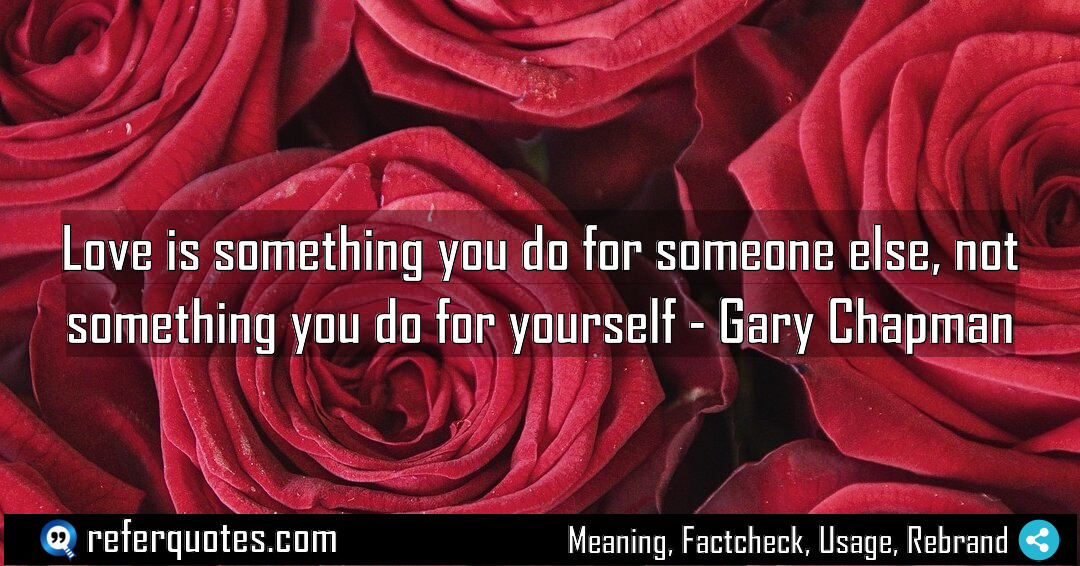
Love is something you do for someone else, not something you do for yourself. It’s a powerful reframe that shifts love from a feeling to a conscious, deliberate action focused on the other person’s needs.
Share Image Quote:
Table of Contents
Meaning
At its core, this quote argues that genuine love is an outward-focused action, not an inward-focused emotion pursued for personal gratification.
Explanation
Look, here’s the thing I’ve seen over and over. We get love all twisted up. We think it’s this warm, fuzzy feeling that we’re supposed to *get*. But Chapman is saying, no—that’s the result. The real work, the actual love, is in the doing. It’s in the act of serving, understanding, and prioritizing the other person’s emotional world, even when you don’t feel like it. It’s moving the focus from “what am I getting?” to “what can I give?” And honestly, that’s where the magic, the real lasting connection, actually happens. It’s a verb, not just a noun.
Quote Summary
Reading Level40
Aesthetic Score72
Origin & Factcheck
This line comes straight from Gary Chapman’s 1992 book, The 5 Love Languages: The Secret to Love That Lasts, which originated from his work as a marriage counselor in the United States. It’s a central thesis of his entire framework, not just a passing remark. You sometimes see the sentiment paraphrased or attributed vaguely to “relationship experts,” but the specific phrasing and the powerful concept behind it are Chapman’s.
Attribution Summary
Author Bio
Dr. Gary Chapman is a pastor/counselor who authored many books such as Five Love Languages which has transformed millions of relationships. He teaches families and couples on how to express love and care in ways that are understood. He holds multiple degrees from Wheaton, Wake Forest, and Southwestern Seminary, he blends scholarship with real-life counselling. For a quick overview of his works, check this Gary Chapman book list and find tips for better marriage, parenting, and personal growth.
| Official Website | Facebook | X| Instagram | YouTube
Where is this quotation located?
| Quotation | Love is something you do for someone else, not something you do for yourself |
| Book Details | Publication Year/Date: 1992; ISBN/Unique Identifier: 9780802412706; Last edition: Revised Edition (2015); Number of pages: 208 |
| Where is it? | Chapter 5: Acts of Service, Approximate page 99, Revised Edition (2015) |
Context
This idea is the engine of his whole “Love Languages” concept. Chapman observed that couples often fail to feel loved not because their partner is malicious, but because they’re speaking different emotional languages. The quote sets the stage: if love is an action for the *other* person, then you must learn to act in *their* specific language—be it Words of Affirmation, Acts of Service, etc.—not just your own.
Usage Examples
This isn’t just theory. You use this.
- In a coaching session with a frustrated partner: “You feel unloved because she doesn’t say it? But if ‘love is something you do for someone else,’ maybe her language is Acts of Service. She shows love by doing the laundry. The action is the love.”
- For a parent feeling disconnected from a teen: “Your kid’s language might be Quality Time. Putting your phone away and just being present, even when it’s boring for you? That’s doing love for them.”
- For yourself, on a day you’re just not feeling it: “The feeling isn’t there today. Okay. But love is an action. So I’m going to make them coffee their way. The action comes first, the feeling often follows.”
To whom it appeals?
| Context | Attributes |
|---|
| Theme | Principle (838) |
|---|
| Audiences | couples (158), faith communities (6), relationship counselors (1), teachers (1125), youth (3) |
|---|
| Usage Context/Scenario | motivational talks (410), parental guidance classes (1), premarital counseling (4), relationship advice videos (2), sermons (21), social media reflections (14), wedding ceremonies (1) |
|---|
|
|
|
|
|
|
|
|
|
|
|
Share This Quote Image & Motivate
Motivation Score85
Popularity Score75
Shareability Score70
Common Questions
Question: Doesn’t this lead to resentment? If I’m always doing for others, what about me?
Answer: Brilliant question, and a common trap. The goal isn’t self-neglect. It’s about filling the other’s “emotional tank.” A full tank means they are more likely to reciprocate love in *your* language. It creates a healthy cycle of giving and receiving, not a one-way street.
Question: Is this just for romantic relationships?
Answer: Not at all. The principle is universal. It applies to parent-child dynamics, deep friendships, even leadership. Any relationship where genuine care is the goal.
Question: What if my actions aren’t appreciated?
Answer: This is key. You have to act in *their* love language, not yours. Doing dishes for someone who craves Words of Affirmation might go unnoticed. The “action” is useless if it’s not in the right dialect. That’s why discovering their language is the critical first step.
Similar Quotes
Love is not only something you feel, it is something you do. This simple shift in perspective, from passive emotion to active verb, is the secret to making love last.…
You know, I’ve seen so many couples hit that wall where the initial spark fades. Gary Chapman nails it by saying, “In marriage, love is a verb.” It’s not a…
Love begins when someone else’s needs become more important… it’s a powerful shift from ‘me’ to ‘we’. This isn’t just sentiment; it’s the practical engine of lasting relationships. Let’s break…
Love is not to be found in someone else… it’s a powerful idea that flips the entire script on romance. Instead of searching for your other half, you realize you’re…
To love completely means to accept the other as they are. It’s a simple idea, but it’s the hardest work you’ll ever do in any relationship. Let’s break down why…
